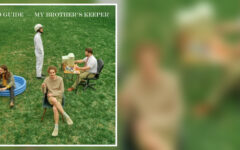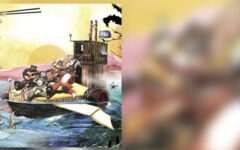
Dog owners tend to be sensitive souls, which makes it a pretty good guarantee that any song about a beloved pet, especially one that’s dearly departed, will cause tear ducts to get to work being seduced by sentiment. So credit Jay Armsworthy & Eastern Tradition for being well aware of the effect that a good song about a special pooch can leave on a listener. Hence, their new album offers the obligatory tearjerkers, Billy the Bluegrass Beagle, the true story of an adopted dog whose obsession for music mooted its hunting ability, and Pearl, an ode to a faithful furry companion that brings to mind the wistful reflection of Merle Haggard’s Sing Me Back Home.
Not surprisingly then, Armsworthy — a singer and guitarist based in the eastern environs that extend from the nation’s capitol to the streets of Baltimore — is a traditionalist at heart. And though his songs don’t always dwell entirely on dogs (contrary to what the album title suggests), he does pay heed to a decidedly timeless template, whether it’s his vintage interpretation of the Kenny Rogers classic Lucille or a sprightly instrumental take on When the Saints Go Marching In. In-between, he and his compatriots — Lewis Layton on bass, Leon Morris on mandolin and guitar, Scott Walker playing banjo, and Dale Eyler, his faithful fiddle player — stir up a series of rousing revelries, from the banjo twang of Got No Reason for Goin’ Home and the upbeat instrumental Shredin’ It Down, to a faithful revisit to the familiar standard Don’t Let Your Deal Go Down.
Still, it’s hard to avoid the impression that Armsworthy and company are also hooked on heartbreak, as evidenced by an abundance of songs that deal with despair. Their cover of Woody Guthrie’s vintage classic, Worried Man Blues, is but one example, and when they delve deep into addiction on The Needle, any hint of a fanciful flirtation gives way to hard reality. Yet they do find redemption. Take, for example, (Some Call It Heaven) I Call It Home, a hopeful look at the hereafter where “Some call it paradise beyond the skies.”
Ultimately then, the band do more than simply describe a dog’s life, turning instead to songs of circumstance, sobriety, and life’s journey overall. In the process, they prove it takes no more than the wag of a tail, the pluck of strings, and some fiddle frenzy to encourage an audience to occasionally howl with delight.







